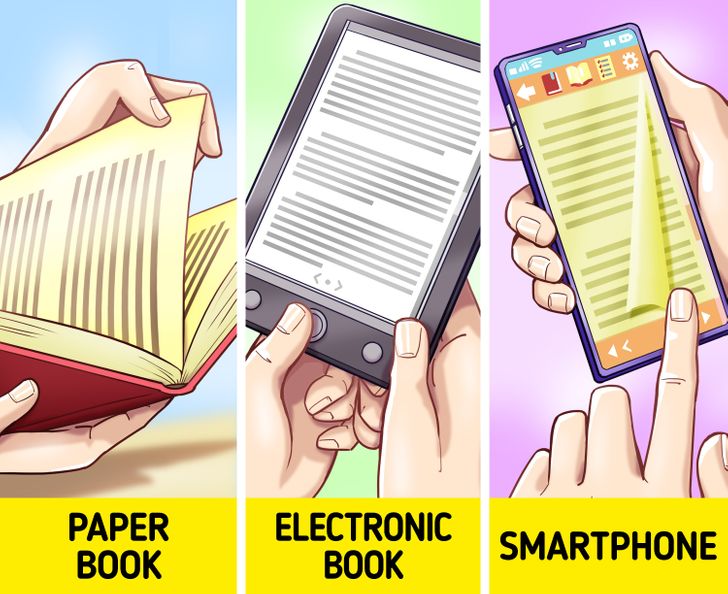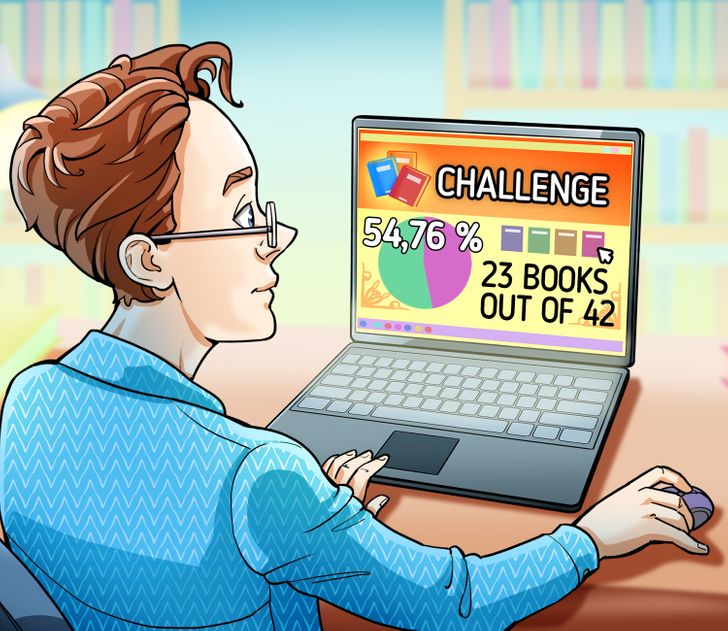How to Read More Books. 9 Tips for Kids and Adults

Reading is an enthralling hobby that we often don’t have enough time for. In the morning, we get distracted by the whirl of everyday tasks and in the evening we get so tired that it seems we have no more energy to focus on the text and delve into the content of the book.
5-Minute Crafts collected 9 tips that can help you allot more time for reading, not put it off, and enjoy it to the fullest.
1. Always carry a book with you.

Wherever you go, make sure to always take a book with you. It will help you to pass the time in places like:
- On public transport when you commute to work
-
In a waiting lounge at an airport or a railway station
-
In a waiting room for a doctor
-
During a break for a cup of tea at work
Reading for just 10-15 minutes a day may seem like a frivolous thing. But minutes make hours, while hours make days, and voila... you have another finished book.
2. Read on your smartphone or e-book.

You don’t necessarily have to always carry a paper book with you. You can use a special device (an e-book) or simply download a reading app on your smartphone.
The latter option can help you cope with the habit of always scrolling your social media newsfeed. Instead, open an easy-to-read non-fiction book and imagine you are reading an interesting post on Facebook. Move the application icon to the home screen, and conversely, hide your social media apps. Over time, when the mobile device is unlocked, the finger itself will be reaching for the desired icon automatically.
3. Make reading a part of your daily schedule.
Allot a specific time for reading and ask your loved ones to not disturb you during this time. It will be even better if you connect reading with certain events — this will help you develop a habit and read every time you experience a trigger. For example, you can read:
- In the morning or in the evening, right after having a meal
One hour before going to sleep
During your lunch break at work
After doing yoga, stretching exercises, or meditation
4. Listen to audiobooks.

Audiobooks are a good way to spare time for reading while you are busy with your everyday routine and tasks. They can be listened to when you are driving, cooking lunch, cleaning the house, working out at the gym, or jogging in the park.
Moreover, some applications allow you to freely switch between text and audiobooks and restart reading from the place where you stopped. It is convenient if you are on a train, for example, and get tired of reading the text. Switching to audio will let you close your eyes, relax, and continue reading the book but in a different format.
5. Set a goal.

You can set a goal for how many books you want to read within a month or a year. The main thing is to be realistic and not set a number that you won’t be able to read. You can even set the number of pages to be read during a day or a week if you are disciplined.
Finally, you can challenge yourself and take part in one of the reading challenges that are held on online platforms for reading fans. You can set the number of books, while the site will share its recommendations and help you monitor and check the process.
6. Make a to-read list.
Make a list of books you want to read. It can be one big common list or a list separated into genres like novels, non-fiction, or sci-fi.
If you don’t know where to start, use recommendations. Check the reading lists of famous people (Bill Gates and Emma Watson often publish their own reading lists) or the ratings of best books according to various publishers (for example, ВВС or Britannica).
7. Give up on boring books.
If you find certain books uninteresting or boring, don’t hesitate to stop reading them. You don’t have to read through to the end just because you started. Keep in mind that reading is a hobby, not an obligation. Read only the books that you like and don’t bore yourself with stories that don’t capture your interest. Simply move on to the next book on your list. Who knows, maybe you’ll like the next one more.
8. Read several books at once.

You can get bored by reading the same book, especially if you’ve started to read something monumental like War and Peace by Leo Tolstoy. Choose another book but one that is easier to read. For example, something entertaining from the non-fiction genre. Alternate it with the main book and get back to it when you feel like taking a break from the serious read and reading something easy and funny.
9. Read blogs and listen to podcasts about books.
Search for inspiration on the internet:
-
Sign up for interesting pages on social media where bloggers post their reviews about the books they recently read.
-
Listen to podcasts, where they analyze the specifics and interesting moments in popular books, as well as share recommendations on what to read.
-
Join a reading club — it will let you discuss the things you read with like-minded people, write reviews, read other people’s feedback, and fill your reading list with new ideas.